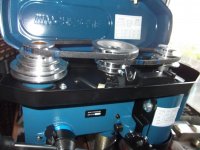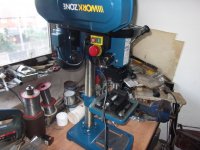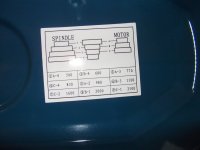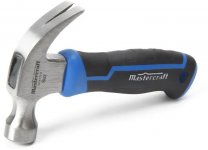I use a centre punch and a hammer. It doesn't take much of a tap with the hammer to create a good punch mark.
Rubber hammer.
Painter's tape to mark the layout.
I ave got a much earlier one of those Record ones for £10 at a flea market and while I was finding a power drill to fit I spotted a full size bench-top nine speed drill press for £60 brand new at our local discount store in the middle isle. I put one in the wheelie basket right away. Later offerings have been rather plasticy.Ok, but what does that mean in practice?
If you've got a spare electric drill you might be able to find a drill press you can bolt it into.
I got one made by Record Power (DS19) for ~£70 four or five years ago. Discontinued. But there are others similar and DS19 is certainly good enough for drilling into heatsinks. I fitted an older variable speed Bosch electric drill into it and have been using it to drill holes in casework without problems.
One thing to consider though, I do miss a laser crosshair that comes with many 'proper' stands...
I took photos as I got it out of the box and put it together it was back in 2016.
Attachments
Nah. I'd probably use a dead-blow rather than a rubber mallet. But a tap with a plain claw hammer works too. Ain't broken. Don't fix.Rubber hammer.
Tom
It's a problem. Some things need the weight of metal IMO. But a lot of the offerings in Lidl and Aldi are decent, especially at the price, and they have a good returns policyLater offerings have been rather plasticy
You are right.
They just do mostly good general purpose tools.
Then there are those really good ones to be had.
They certainly know how to keep your eyes on there middle isles.
They just do mostly good general purpose tools.
Then there are those really good ones to be had.
They certainly know how to keep your eyes on there middle isles.
I agree with many of the suggestions, but just wanted to note a few things.
– "Precision" of the drill press, as long as the chuck is running concentric and the table is square to the shaft, is not a big issue. Once you center punch, you aim for the dent, and the bit will find it. I find sometimes you have to very slightly shuffle the workpiece to let the drill run straight down, as the bits are a little flexible and will drill at a small angle if you force them to.
– Anything bigger than just two or three mm, it's best to use a smaller bit first, then step up to a larger size, in stages if needed, about 2x at a step.
– Spend good money on good bits. Split-point bits seem to dig right in and find the center of the punch divot better than normal ones.
– Use clamps or a drill press vise when you can, especially with larger holes. Aluminum is a very "sticky" material that can grab. Drill presses don't seem all that dangerous, but they can get a big piece of metal whirling and you can end up with an injury. Ask me how I know.
– "Step" drills are great for larger holes in sheet metal, which twist bits are not very good at (you can end up with rough edges or weird triangular holes if the piece is not well-clamped and backed up by scrap wood.
– Deeper holes in aluminum are best accomplished by "peck" drilling, where you drill a little, bring the bit back up occasionally to clear the chips, and even scrape them off the spirals if you need to. Gunked up bit tips are a main cause of broken bits in my experience. Any kind of lubricant will help here.
– Tapping aluminum requires 1) the absolutely right size drill, 2) good quality taps, "spiral" of you can get them, 3) lubricant, 4) periodic backing out to clear chips and 5) a really sensitive touch. You will probably break some taps acquiring this skill.
– Lots of good tools and bits available inexpensively at flea markets and eBay, obviously.
– "Precision" of the drill press, as long as the chuck is running concentric and the table is square to the shaft, is not a big issue. Once you center punch, you aim for the dent, and the bit will find it. I find sometimes you have to very slightly shuffle the workpiece to let the drill run straight down, as the bits are a little flexible and will drill at a small angle if you force them to.
– Anything bigger than just two or three mm, it's best to use a smaller bit first, then step up to a larger size, in stages if needed, about 2x at a step.
– Spend good money on good bits. Split-point bits seem to dig right in and find the center of the punch divot better than normal ones.
– Use clamps or a drill press vise when you can, especially with larger holes. Aluminum is a very "sticky" material that can grab. Drill presses don't seem all that dangerous, but they can get a big piece of metal whirling and you can end up with an injury. Ask me how I know.
– "Step" drills are great for larger holes in sheet metal, which twist bits are not very good at (you can end up with rough edges or weird triangular holes if the piece is not well-clamped and backed up by scrap wood.
– Deeper holes in aluminum are best accomplished by "peck" drilling, where you drill a little, bring the bit back up occasionally to clear the chips, and even scrape them off the spirals if you need to. Gunked up bit tips are a main cause of broken bits in my experience. Any kind of lubricant will help here.
– Tapping aluminum requires 1) the absolutely right size drill, 2) good quality taps, "spiral" of you can get them, 3) lubricant, 4) periodic backing out to clear chips and 5) a really sensitive touch. You will probably break some taps acquiring this skill.
– Lots of good tools and bits available inexpensively at flea markets and eBay, obviously.
I used to have a shop right across the street from my former house that sold cheap tools (it was called Post Tools) I picked up a 10" mini-drill press from them that has served me well over the years. Before that, I used to get by with one of those ganky adapters that held a hand drill.
Many years ago (over 10), wanted a drill press and started with the little gizmo's to that will hold a hand drill, and kind of make a drill press.
Maybe they have improved since then, but I wasn't impressed.
I got lucky after that and bought a Delta benchtop dp350 on sale for a reasonable price. I'll be sad when it dies, but its served me will for a long time.
The delta is a 12" table with a 3 1/4" stroke.
Only on very rare occasions I've had trouble drilling something because the table wasn't bigger, so this size has worked for me.
Not sure I could say the same if I had a 8" table with a 2" stroke, but you work with what you have.
Good luck with your search.
Maybe they have improved since then, but I wasn't impressed.
I got lucky after that and bought a Delta benchtop dp350 on sale for a reasonable price. I'll be sad when it dies, but its served me will for a long time.
The delta is a 12" table with a 3 1/4" stroke.
Only on very rare occasions I've had trouble drilling something because the table wasn't bigger, so this size has worked for me.
Not sure I could say the same if I had a 8" table with a 2" stroke, but you work with what you have.
Good luck with your search.
£60? Now that's a bargain, I think a second hand Fobco star would be £300. The pulleys look like they're alloy instead of cast iron, but at that price...I ave got a much earlier one of those Record ones for £10 at a flea market and while I was finding a power drill to fit I spotted a full size bench-top nine speed drill press for £60 brand new at our local discount store in the middle isle. I put one in the wheelie basket right away. Later offerings have been rather plasticy.
I took photos as I got it out of the box and put it together it was back in 2016.
Cowells used to make a nice small drill press, but I can't find any pictures, in old magazines or on Google, if it's that rare, there's not much point in me recommending it.
I used to live in the Bay Area (San Jose) which had a business called Post ToolI used to have a shop right across the street from my former house that sold cheap tools (it was called Post Tools) I picked up a 10" mini-drill press from them that has served me well over the years. Before that, I used to get by with one of those ganky adapters that held a hand drill.
Kinda like a Harbor Freight but better
First you have to layout where you want to drill. This is accurately done with an adjustable square and a scribe. You adjust the square to the first dimension and place the scribe in the edge notch and pull the square and scribe towards you. Then adjust for the other dimension and scribe that line.
A prick punch is almost the same as a center punch except the tip is at a sharper angle. You will find this can slide in the marking scores you just scribed. Thus you should be able to make a small indent exactly where your scribed lines intersect.
Next you use a blunter center punch to make a really nice and deep dent that your drill bit will love to dive into.
A center drill as previously shown can then be used to start a larger hole. For your size you should be able to drill it directly. Be sure to use a cutting lubricant intended for aluminum when drilling and and tapping the hole.
Now a nice trick is to use a small piece of .032” thick sheet brass or similar to make a template for all the holes for a transistor. I have one for TO-3 cans with four holes. I just layout and drill the first mounting hole and then bolt the template to the heatsink and use the holes in the template to guide the drill bits for the other three holes. Drill the second mounting hole and bolt that down before drilling the smaller terminal holes.
I have four different size drill presses. Even the second smallest (a bench top unit) would work for drilling a heat sink. The smallest is fine for drilling PCBs. The third is a standard floor standing small (1 HP) type. The largest one is 7.5HP or so and is used for drilling beams with holes up to 4” or so. (You do not freehand a 4” hole in a beam and expect to not be badly injured!)
Of course that raises the issue of how much to spend on a drill press. I would think safety might come into consideration. So how much is a finger like you pinky worth?
Next we can talk about feeds and speeds!
A prick punch is almost the same as a center punch except the tip is at a sharper angle. You will find this can slide in the marking scores you just scribed. Thus you should be able to make a small indent exactly where your scribed lines intersect.
Next you use a blunter center punch to make a really nice and deep dent that your drill bit will love to dive into.
A center drill as previously shown can then be used to start a larger hole. For your size you should be able to drill it directly. Be sure to use a cutting lubricant intended for aluminum when drilling and and tapping the hole.
Now a nice trick is to use a small piece of .032” thick sheet brass or similar to make a template for all the holes for a transistor. I have one for TO-3 cans with four holes. I just layout and drill the first mounting hole and then bolt the template to the heatsink and use the holes in the template to guide the drill bits for the other three holes. Drill the second mounting hole and bolt that down before drilling the smaller terminal holes.
I have four different size drill presses. Even the second smallest (a bench top unit) would work for drilling a heat sink. The smallest is fine for drilling PCBs. The third is a standard floor standing small (1 HP) type. The largest one is 7.5HP or so and is used for drilling beams with holes up to 4” or so. (You do not freehand a 4” hole in a beam and expect to not be badly injured!)
Of course that raises the issue of how much to spend on a drill press. I would think safety might come into consideration. So how much is a finger like you pinky worth?
Next we can talk about feeds and speeds!
Last edited:
I used an old TO-3 device that had failed. No need to procure a separate bit of material.
I nipped the top off in a vice and ripped the leads out.
I hammered a wire nail or broken drill through the lead holes to clear the remaining insulation.
The same two bolt method works fine.
I nipped the top off in a vice and ripped the leads out.
I hammered a wire nail or broken drill through the lead holes to clear the remaining insulation.
The same two bolt method works fine.
+ on Wen mentioned earlier I purchased it from Amazon as well. Price was right takes only small space on bench, and has reasonable accuracy. Of course none of the lower end drill press run slow enough but you just make do. Don’t forget to get a vice and a few clamps and your good to go and your pocket won’t be hurt to bad.
Bill
Bill
Most of the big American producers seem to have gone out of steel tooling, shifting to carbide.
Google is your friend:
https://www.google.com/search?client=firefox-b-d&q=center+drills+North+America
Specify what you need, it is a cheap item here, 5-10 USD for a 3/8 inch drill.
Google is your friend:
https://www.google.com/search?client=firefox-b-d&q=center+drills+North+America
Specify what you need, it is a cheap item here, 5-10 USD for a 3/8 inch drill.
Question: does anyone regularly use the multiple speeds on these drill presses? I have always just set the thing on the lowest speed and left it there. But I usually focus on wood and don't often work with metal beyond the odd flat/bracket like things.
Not a machinist, 30+ years ago I worked in shops with them, so I have used metal lathes, mills, etc. a couple times (and managed to not lose anything that didn't grow back), but that was semi-supervised where I could ask an old-hand.
Not a machinist, 30+ years ago I worked in shops with them, so I have used metal lathes, mills, etc. a couple times (and managed to not lose anything that didn't grow back), but that was semi-supervised where I could ask an old-hand.
I change the speed all of the time depending of the bit size/type and material.
I wish I had a VFD for easy speed change and for speeds below 300rpm(lowest I have now with pulleys)
I wish I had a VFD for easy speed change and for speeds below 300rpm(lowest I have now with pulleys)
- Home
- Design & Build
- Equipment & Tools
- Small drill press



